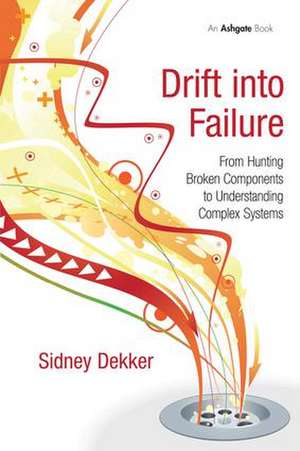Drift into Failure: From Hunting Broken Components to Understanding Complex Systems
Autor Sidney Dekkeren Limba Engleză Paperback – 28 feb 2011
| Toate formatele și edițiile | Preț | Express |
|---|---|---|
| Paperback (1) | 378.79 lei 3-5 săpt. | +21.01 lei 5-11 zile |
| CRC Press – 28 feb 2011 | 378.79 lei 3-5 săpt. | +21.01 lei 5-11 zile |
| Hardback (1) | 1109.18 lei 6-8 săpt. | |
| CRC Press – 28 feb 2011 | 1109.18 lei 6-8 săpt. |
Preț: 378.79 lei
Nou
Puncte Express: 568
Preț estimativ în valută:
72.49€ • 75.40$ • 59.85£
72.49€ • 75.40$ • 59.85£
Carte disponibilă
Livrare economică 24 martie-07 aprilie
Livrare express 08-14 martie pentru 30.100 lei
Preluare comenzi: 021 569.72.76
Specificații
ISBN-13: 9781409422211
ISBN-10: 1409422216
Pagini: 234
Ilustrații: Includes 3 b&w illustrations
Dimensiuni: 156 x 234 x 18 mm
Greutate: 0.41 kg
Ediția:New ed
Editura: CRC Press
Colecția CRC Press
ISBN-10: 1409422216
Pagini: 234
Ilustrații: Includes 3 b&w illustrations
Dimensiuni: 156 x 234 x 18 mm
Greutate: 0.41 kg
Ediția:New ed
Editura: CRC Press
Colecția CRC Press
Public țintă
Academic and PostgraduateCuprins
Contents: Preface; Failure is always an option; Features of drift; The legacy of Newton and Descartes; The search for the broken component; Theorizing drift; What is complexity and systems thinking?; Managing the complexity of drift; Bibliography; Index.
Notă biografică
Sidney Dekker is Professor and Director of the Key Centre for Ethics, Law, Justice and Governance at Griffith University in Brisbane, Australia. Previously Professor at Lund University, Sweden, and Director of the Leonardo Da Vinci Center for Complexity and Systems Thinking there, he gained his Ph.D. in Cognitive Systems Engineering from The Ohio State University, USA. He has worked in New Zealand, the Netherlands and England, been Senior Fellow at Nanyang Technological University in Singapore, Visiting Academic in the Department of Epidemiology and Preventive Medicine, Monash University in Melbourne, and Professor of Community Health Science at the Faculty of Medicine, University of Manitoba in Canada. Sidney is author of several best-selling books on system failure, human error, ethics and governance. He has been flying the Boeing 737NG part-time as airline pilot for the past few years. The OSU Foundation in the United States awards a yearly Sidney Dekker Critical Thinking Award.
Recenzii
'"Accidents come from relationships, not broken parts." Sidney Dekker's meticulously researched and engagingly written Drift into Failure: From Hunting Broken Parts to Understanding Complex Systems explains complex system failures and offers practical recommendations for their investigation and prevention from the combined perspectives of unruly technology, complexity theory, and post-Newtonian analysis. A valuable source book for anyone responsible for, or interested in, organizational safety.' Steven P. Bezman, Aviation safety researcher 'Dekker’s book challenges the current prevalent notions about accident causation and system safety. He argues that even now, what profess to be systemic approaches to explaining accidents are still caught within a limited framework of ’cause and effect’ thinking, with its origins in the work of Descartes and Newton. Instead, Dekker draws his inspiration from the science of complexity and theorises how seemingly reasonable actions at a local level may promulgate and proliferate in unseen (and unknowable) ways until finally some apparent system "failure" occurs. The book is liberally illustrated with detailed case studies to articulate these ideas. As with all Dekker’s books, the text walks a fine line between making a persuasive argument and provoking an argument. Love it or hate it, you can’t ignore it.' Don Harris, HFI Solutions Ltd 'Dekker's book contributes to the growing debate around the nature of retrospective investigations of safety-critical situations in complex systems. Both provocative and insightful, the author shines a powerful light on the severe limits of traditional linear approaches. His call for a diversity of voices and narratives, to deepen our understanding of accidents, will be welcomed in healthcare. Dekker’s proposal that we shift from going "down and in" to "up and out" suggests a paradigm shift in accident investigation.' Rob Robson, Healthcare System Safety and Accountability, Canad
Descriere
This book explores complexity theory and systems thinking to better understand how complex systems drift into failure. It studies sensitive dependence on initial conditions, unruly technology, tipping points, diversity - and finds that failure emerges opportunistically, non-randomly, from the very webs of relationships that breed success and that are supposed to protect organizations from disaster. It develops a vocabulary that allows us to harness complexity and find new ways of managing drift.


























